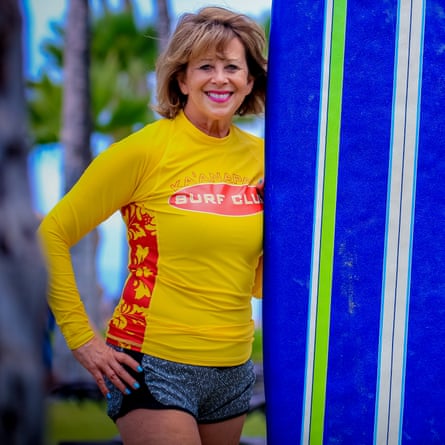
Kerrie Houston Reightley has always been sporty. Three years ago, she was on holiday in Maui, Hawaii, with her husband and their son, then 18. “We were walking along the beach. There were all these things you could do – snorkelling, trekking. And I was like: ‘Learn to surf!’ I want to do that.”
The 64-year-old is a writer and substitute teacher, and clearly believes in research. She went back to the hotel and started watching videos on how to surf. “I was standing on the bed, trying to balance,” she says. But out on the water, it was a different matter. She was out of her depth, in all senses. “I’m athletic. I do spin classes, I cross-train, I row and I play a lot of tennis. I do a lot of things. I thought: I ought to be able to do this.” Photographs show her “crashing and burning”. She never got up on the board – but vowed to go back for more.
Houston Reightley grew up in the Seattle area. Her father, she says, “was a great athlete. He turned me into a great athlete.” At 6ft 5in, and an “all-star-everything jock”, he taught Houston Reightley and her four siblings how to play tennis. Clearly, her father was a big influence on her. “It was this whole idolising my dad thing,” she says. “He was a writer. We would fall asleep to my dad pounding away on his old Remington typewriter. In the morning he’d read us his manuscript, and we’d clap.”
Her failure to get up on the surfboard rankled. “I was determined that I was going to do it.” A few months later, when she and her husband went to Mexico, “I prepared myself. It was more psychological than physical. I felt I had to solve this puzzle.”
In Sayulita, Mexico, the water was less deep, but the waves came in faster. Houston Reightley booked a private instructor and “made sure at the surf shop: ‘I want someone to take photos of me because I’m going to stand up.’” Even the “beware of alligators” sign didn’t faze her. She just researched what to do if you come face-to-face with one (“watch their eyes”), and became “hyper-focused”. This time, her instructor showed her how to protect her head, and to fall backward instead of forward.
“I just remember the feeling right before I walked out. I felt like I was in a competition. I got myself into the right mindset: ‘I’m going to win this match.’ I stood up the first time I tried. There’s a picture of me and my hair is dry and I’m standing on the board. Once you experience that sensation, you understand it better. You get a feel for it, like riding a bike.”
A competitive approach might seem like a lot of pressure, but Houston Reightley says she finds competing “meditative”. She was devastated 10 years ago, when her younger brother, with whom she was “super close”, died of cancer. “I felt like never talking to anybody again. Instead, I went out and trained for a triathlon.”
In childhood, she says, her family was like its own little tennis club. So now, “when I’m competing, I feel so happy. Win or lose. Though I’m trying to win, of course.” She has been playing on tennis teams for 52 years, including when she was pregnant. Houston Reightley credits sport with “why I feel like I’m in good mental and physical shape … I always focus on the fact that I’m healthy. And, sure, our bodies don’t look like they did in our 20s, 30s, 40s. But I’m in good shape and good health. We look different when we’re older. It’s OK.”
Next Houston Reightley plans surfing trips to Bali – her mum was from Indonesia – and British Columbia. But sometimes when she writes articles about her sporting experiences, she notices that her words are accompanied by stock images of women – usually white, and usually in their 40s. “There aren’t photos of older women working out,” she says. “That’s not the way women in their 60s are seen. My friends in their 60s are athletes. I would like to put that out there.”


